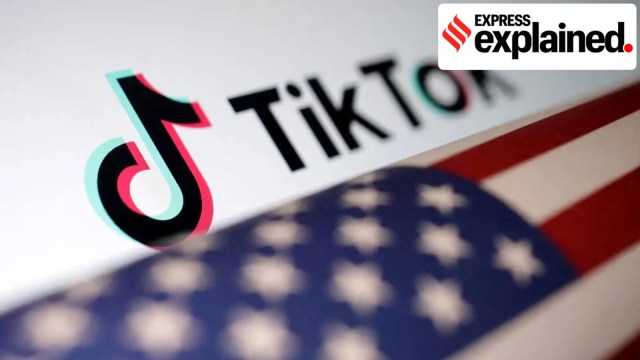What are the grounds for challenge to US law forcing TikTok sale?
The Act, which was signed into law by President Joe Biden on April 24, came after federal agencies and politicians raised concerns about data collection and surveillance through TikTok.
 The challenge at the US Court of Appeals for the District of Columbia Circuit argues that this “qualified divestiture” is “simply not possible: not commercially, not technologically, not legally”. (Reuters/File)
The challenge at the US Court of Appeals for the District of Columbia Circuit argues that this “qualified divestiture” is “simply not possible: not commercially, not technologically, not legally”. (Reuters/File)TikTok Inc and its Chinese parent company ByteDance Ltd have challenged the US Protecting Americans from Foreign Adversary Controlled Applications Act, which stipulates that for the social media app to continue in the US, it must be sold to a company not controlled by a “foreign adversary” before January 19, 2025.
The Act, which was signed into law by President Joe Biden on April 24, came after federal agencies and politicians raised concerns about data collection and surveillance through TikTok.
The challenge at the US Court of Appeals for the District of Columbia Circuit argues that this “qualified divestiture” is “simply not possible: not commercially, not technologically, not legally”.
‘Severing US ops not feasible’
The petition provides three reasons to justify why a sale to create a “standalone US TikTok platform” is not possible.
First, TikTok is a globally integrated platform with content created by users around the world. A standalone US TikTok would be an “island” with a limited pool of content, which would “dramatically undermine the value and viability of the US TikTok business”.
Second, the source code for the app would have to be “wrested” from ByteDance and given to an alternative team of engineers with no experience in running the platform — an impossible task within the timeframe provided. This is a requirement under the Act to ensure there is no “operational relationship” between ByteDance and the new standalone US platform.
Third, sale and export of TikTok’s proprietary “recommendation engine” is not possible without a licence from the Chinese government, which, the petition claims “ has made clear that it would not permit a divestment of the recommendation engine that is a key to the success of TikTok in the United States”.
‘Alternatives tossed aside’
TikTok and ByteDance have submitted that they had drafted a National Security Agreement following negotiations with the US Committee on Foreign Investment in the United States (CFIUS). This agreement, they claim, contained protections that were “more robust than those employed by any other widely used online platform in the industry”, with several measures to protect user data.
These included the creation of a new subsidiary of TikTok, called TikTok US Data Security, which would have US government-approved Security Directors on its board. They also agreed to subject themselves to third-party verification and monitoring by companies approved by the CFIUS. Finally, the agreement included a “shut-down option” that would allow the government to suspend TikTok’s operations in specific cases where the agreement was not complied with.
The petitioners have stated that they have voluntarily begun implementing parts of the agreement that require action from TikTok and ByteDance, and have spent $2 billion on this so far. But Congress disregarded this, and the Act was passed without giving any reasons or justification.
‘Hypothetical threats’
According to the petition, Congress enacted the law without providing any actual “legislative findings” on the threat posed by TikTok, and instead relied on hypothetical scenarios to explain how the platform could pose a threat in the future.
This, according to the petition, falls short of the legal standard of “compelling interest” in the US, whereby a law must address real harms that are “not merely conjectural (based on incomplete information)” and show that it will “alleviate these harms in a direct and material way”.
The filing also claims that the law is “under-inclusive”, allowing other platforms that could pose similar problems to continue existing, while being “over-inclusive” by applying to all ByteDance-owned applications without showing that they pose risks for the Act to address. The petitioners claim that the Act turns ByteDance and TikTok into a “vilified class” by prohibiting all current and future operations in the US.
While the Act automatically applies to TikTok and ByteDance, for other companies, a “presidential determination” would be needed which would include the issuance of a public report on specific national security concerns posed, and the assets that must be sold for the company to continue operating in the US.







- 01
- 02
- 03
- 04
- 05































